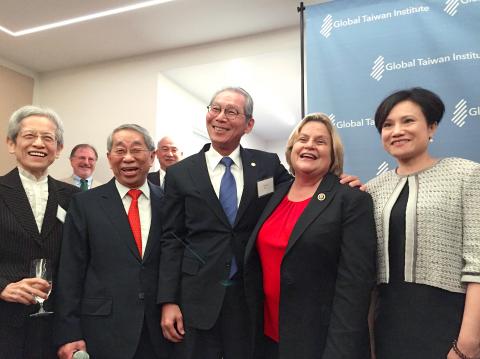The Global Taiwan Institute (GTI), a think tank that aims to protect Taiwanese democracy and national security by strengthening Taiwan-US relations, on Wednesday held an event at its headquarters in Washington to mark its inauguration.
The GTI is the first US-based think tank dedicated to Taiwanese interests and is said to be well-funded, reportedly spending US$24 million on the property for its headquarters in Dupont Circle, a neighborhood known for its heavy presence of embassies and prestigious think tanks.
The event was attended by almost 100 Taiwanese-Americans, research institute experts, diplomats and politicians.

Photo: CNA
Among the attendees were US Representative Ileana Ros-Lehtinen of the Republican Party and US Representative Grace Meng of the Democratic Party; New Power Party (NPP) Legislator Freddy Lim (林昶佐); Taiwan’s Representative to the US Stanley Kao (高碩泰); former US senior official to APEC Robert Wang; US-based Center for Strategic and International Studies (CSIS) senior vice president for Asia Michael Green; Bonnie Glaser, senior adviser for Asia and director of the China Power Project at the CSIS; and Heritage Foundation director of Asian studies Walter Lohman.
GTI chairman Robert Lai (賴義雄) said the institute’s mission is to develop leaders and advocates for a strong Taiwan-US relationship for the next generation.
Kao said the GTI and the Taipei Economic and Cultural Representative Office in the US have the same aims, and he looked forward to the two working together to promote Taiwan in the international community, and to improving and strengthening Taiwan-US relations, according to the Central News Agency.
Ros-Lehtinen said the US must remain committed to the “six assurances” — a series of guarantees for Taiwanese security against Chinese claims — as the foundation of US-Taiwan relations.
The GTI said it would hold its first academic conference on Thursday next week. The conference is to be chaired by former American Institute in Taiwan deputy director David Keegan and is to look at issues such as whether the US needs to change course on its Taiwan policy that was set out in 1994.
Sources who attended the event said that US lawmakers are expected to propose a bill which would lift restrictions barring high-ranking Taiwanese officials from visiting Washington and US military commanders from visiting Taiwan.

DAREDEVIL: Honnold said it had always been a dream of his to climb Taipei 101, while a Netflix producer said the skyscraper was ‘a real icon of this country’ US climber Alex Honnold yesterday took on Taiwan’s tallest building, becoming the first person to scale Taipei 101 without a rope, harness or safety net. Hundreds of spectators gathered at the base of the 101-story skyscraper to watch Honnold, 40, embark on his daredevil feat, which was also broadcast live on Netflix. Dressed in a red T-shirt and yellow custom-made climbing shoes, Honnold swiftly moved up the southeast face of the glass and steel building. At one point, he stepped onto a platform midway up to wave down at fans and onlookers who were taking photos. People watching from inside

MAKING WAVES: China’s maritime militia could become a nontraditional threat in war, clogging up shipping lanes to prevent US or Japanese intervention, a report said About 1,900 Chinese ships flying flags of convenience and fishing vessels that participated in China’s military exercises around Taiwan last month and in January last year have been listed for monitoring, Coast Guard Administration (CGA) Deputy Director-General Hsieh Ching-chin (謝慶欽) said yesterday. Following amendments to the Commercial Port Act (商港法) and the Law of Ships (船舶法) last month, the CGA can designate possible berthing areas or deny ports of call for vessels suspected of loitering around areas where undersea cables can be accessed, Oceans Affairs Council Minister Kuan Bi-ling (管碧玲) said. The list of suspected ships, originally 300, had risen to about

A Vietnamese migrant worker yesterday won NT$12 million (US$379,627) on a Lunar New Year scratch card in Kaohsiung as part of Taiwan Lottery Co’s (台灣彩券) “NT$12 Million Grand Fortune” (1200萬大吉利) game. The man was the first top-prize winner of the new game launched on Jan. 6 to mark the Lunar New Year. Three Vietnamese migrant workers visited a Taiwan Lottery shop on Xinyue Street in Kaohsiung’s Gangshan District (崗山), a store representative said. The player bought multiple tickets and, after winning nothing, held the final lottery ticket in one hand and rubbed the store’s statue of the Maitreya Buddha’s belly with the other,

Japan’s strategic alliance with the US would collapse if Tokyo were to turn away from a conflict in Taiwan, Japanese Prime Minister Sanae Takaichi said yesterday, but distanced herself from previous comments that suggested a possible military response in such an event. Takaichi expressed her latest views on a nationally broadcast TV program late on Monday, where an opposition party leader criticized her for igniting tensions with China with the earlier remarks. Ties between Japan and China have sunk to the worst level in years after Takaichi said in November that a hypothetical Chinese attack on Taiwan could bring about a Japanese